Peter MALONE
From the Vine
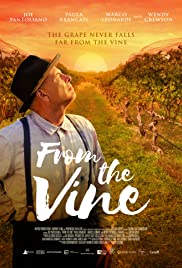
FROM THE VINE
Canada, 2020, 97 minutes, Colour.
Joe Pantoliano, Paula Brancati, Marco Leonardi, Wendy Crewson, Tony Nardi, Tony Nappo, Franco Lo Presti, Kevin Hanchard.
Directed by Sean Cisterna.
From the vine came…, the grapes…, the wine, as the popular songs sings. And, certainly by the end of the film, the wine is flowing.
This is a Canadian story but it has its origins in Italy and it has its fulfilment in Italy, especially in the vineyards, the wine press, those barrels of local red. And the locality is in the Basilicata region of southern Italy, especially the hilltop Acerenza, one of the most picturesque and well preserved of those mediaeval cities (and filmed, frequently throughout the film, from spectacular helicopter angles). Anyone who loves cinema visits to the Italian countryside will not be disappointed in this display of wonderful scenery.
And Canada? This is the story of a young boy (Marco) who grew up in Acerenza racing the passing trains with his schoolfriends, bonding with his grandfather who owned and worked the vineyards. But, off he went with his mother to Canada, went to school, got his law degree, married, had a daughter, a great business success story. But, as they say, there comes a time in the tides… Marco’s vision is challenged and he melts, publicly, quitting his job (and not telling his wife and daughter). He decides to escape, back to Italy, back to Acerenza, back to his past.
This is where the film becomes very Italian, the range of townspeople, many idiosyncratic to say the least, discovering his old friends, going back to his grandfather’s house, becoming inspired by the vines and… Not hard to guess the rest. In fact, this is a great opportunity for veteran actor, especially in TV, Joe Pantoliano, to get main billing. He is likable, at moments irritating, having to get over himself, but exhilarated by going back home, his grandfather appearing to him from time to time (and, which may be a bit much for some audiences’ sense of realism, some of the leaves of the vines talk to him, and he talks back.)
Canada then intrudes on Italy with a sudden visit from his wife (Wendy Crewson) and daughter (Paula Brancati), his wife exasperated, especially as she discovers he has cleared out there retirement account, the daughter having to get over resentment of her father’s attempts to mould her into his own image.
But, this is popular and pleasing entertainment – someone criticised it for being “un-demanding”, scoffing by someone who demands demanding cinema! No, this is meant for sitting back, relaxing (and being reminded of what life is like – for some people anyway).
- The title? From the vine, the grapes, the wine…? Expectations?
- Canadian- Italian coproduction, the Canada sequences and the focus on business and jobs? The Italian sequences and the focus on life in the town, the vines, Wine production? The musical score?
- Undermined in entertainment for a popular audience? No more, no less?
- Marco and his story? His memories, flashbacks to his boyhood, in the town, childhood friends, Luca and Amelia, racing the train? His bond with his grandfather? The vineyards? His mother and the migration to Canada? At a young age, becoming Canadian, education, degree in law, his success with corporations? Creative ideas? His age, middle age, relationship with his wife, the demands on his daughter, her alienation? The preparation of his plan, the warning that it was not acceptable, his standing in front of people, the breakdown, resigning his job? Home early, cooking, telling Marina? The disbelief?
- His suddenly going to Italy, the train, the town, no taxis, Luca and the practical jokes about the taxi, holding up the bus, the arrest, revealing who he was? Memories of the past? Meeting Amelia at the bar? Going to the mansion, opening it up, the need for repairs? His wandering the grounds, memories grandfather and the vines? His decision to withdraw the pension fund money, pay the back taxes, connect electricity, settle in?
- Contemplating his life, the decision to make the wine, getting the permits, tracking down Marcello, the plans, the barrels and the eccentricities of Enzo, his squatting in the shack? Rounding up the townspeople, their work in the fields? Enzo and his change of heart, getting the barrels? The grapes, picking them, the processes, Marcello and his advice?
- Marina, upset, the phone call, talking with her daughter, the disappearance of the money? The flight, arriving, the house? Demanding that Marco return? His inviting Marina to tread the grapes, together, the bellowing, change of heart? Laura, her reaction, wanting to go home?
- Marco, John coming to visit him, the chain of hotels? His visit to Rome, the discussions, tasting the wine, making the contract? Arriving back, the young man giving the wrong information, people thinking he was leaving, angrily gathering, his reassurance?
- The touches of the magic realism, the leaves of the vines, hearing them speak, Marco replying, the advice that the leaves were himself speaking to him? That he should listen? Their happiness at the end? The touches with the statues, the touch of life, their moving?
- Marco, success, the townspeople happy, the town come alive, the industry?
Percy vs Goliath
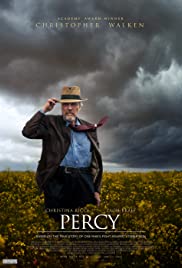
PERCY VS GOLIATH
Canada, 2019, 99 minutes, Colour.
Christopher Walken, Roberta Maxwell, Cristina Ritchie, Zach Braff, Luke Kirby, Martin Donovan, Adam Beach.
Directed by Clark Johnson.
Percy versus Goliath is not the first film version of this particular case, canola farmer in the Canadian midwest, Saskatchewan, Percy Schmeiser and his legal and moral battle with the giant Corporation, genetically modified crops, Monsanto. There had been a 2009 documentary, also using the David and Goliath symbolism, Percy Schmeiser, David versus Monsanto, a 65 minute film featuring Percy himself (who died in 2020).
One might say that this is such a focus on farmers, crops, financial issues that it may not be of great interest in itself for “city slickers”! Unless, of course, they are willing to be caught up in significant social issues, the influence of huge corporations, the victimisation of individuals. (And, in 2020-2021, there have been a number of films taking up these issues, Crisis and the and the pharmaceutical companies, futuristic satire about technology control, Lapsis,).
Audiences who think of Canada in terms of the cities in the east or Vancouver, or all Canada and the Rocky Mountains, might be amazed at the vistas of the vast fields, the crops, flat as far as the eye can see. And, it is interesting that this is a Canadian film about a Canadian issue (albeit with a number of American actors) and that it is a Canadian David-character who confronts and who experiences success against the giant, imperial and imperious global corporation.
A great deal of the impact of the film depends on the excellent performance by Christopher Walken, always a significant screen presence, this time believable as an ordinary farmer, descendant of migrant families, respecting the generations, respecting the land, studying the seeds, successful with his crops. He is supported by his loyal wife, Louise (Roberta Maxwell). He is Percy Schmeiser.
When Percy received correspondence from Monsanto, accusing him of breaking patent, of using Monsanto’s patent for genetically modified seeds for canola, he defends himself. The corporation is relentless, even demanding compensation if crops have been influenced by modified seeds blowing from other fields. The screenplay certainly develops this confrontation into a David versus Goliath battle, the shrewd and simple man standing his ground (for his crops and ground), giving speeches, receiving affirming correspondence and donations, persuaded by campaigner, Rebecca (Cristina Ricci) to travel to India and speak, an extraordinary experience for Percy, the contrast between India and its people, its vastness, corporations taking land, farmer suicides, and his life in Canada.
Zach Braff, with a limp and walking stick, plays Jackson Weaver, the local lawyer that Percy consults and who spends years working with Percy, local hearings, the appeals court and, with Percy’s final fierce determination, taking the case to the Supreme Court in Ottawa.
There have been many films about campaigners against corporations (think Erin Brockovich), there have been protests against destruction of the environment. Percy versus Goliath can take its place amongst this cinema gallery of fights for social causes.
- A true story? The documentary from 2009? And dramatising of the characters and events, issues?
- The Canadian film, the midwest settings, Manitoba, Saskatchewan, the vast open and flat fields? The crops? Homes, Barnes? The contrast with the court proceedings, local, provincial, Supreme Court? The musical score?
- The visit to India, characters, the meetings, the local farmers, the discussions about Monsanto and corporations, the exploitation, farmer suicides? The visual and dramatic contrast between Canada and India?
- Percy’s story, Christopher Walken’s screen presence and performance? The long marriage to Louise? Relationship with Peter, his wife, granddaughter, the granddaughter wanting to be a farmer, Peter not? The work collaboration with Alton Kelly? Friendship?
- Percy’s background, the ancestors migrating to Canada, the farmers, the crops, the keeping of seeds, the developing of seeds, Percy keeping his seeds for decades? The church sequence, going out for the crop? Hard work, way of life?
- The letter, Monsanto and the accusations, wanting samples, Percy warding trespasses off? Going to see Jackson Weaver? Discussions, prospects? Percy and his stances, Louise’s support?
- The hearings, Monsanto lawyer, seeming friendly, the arguments? Losing the case? The prospect of losing the farm, the crops?
- Monsanto’s case, genetically modified crops, patents, accusations of stealing? Percy and the explanation of seeds blowing from other paddocks? The testing of samples, the experts, blaming Percy?
- Rebecca, her crusading background and personality, at the court, the discussions with Percy, his reluctance? Organising the campaigns, the talks, the donations coming in? National interest? The trip to India, Percy reluctant, the issue of the money and cashing the donations? Louise unwilling, her collapse?
- Percy and the experience of India, the talk, the South African saying livelihood depended on genetically modified crops? The contrast with the Indians? Percy urging them not to fight amongst themselves? His tour, the farm, his eyes opened?
- The decision to keep fighting, to the next court, Jackson Weaver, two years of work? Monsanto and the increased number of lawyers? The issues for the appeal? Refused?
- Percy, the interviews, the support and donations, mail? Suspicions at home, change of heart? The dangers for the local farmers and their dependence on Monsanto? The decision to go to the Supreme Court?
- The discussions with Jackson Weaver, his resigning, Percy tearing up the resignation? His studies in preparation for the case? The media? Waiting the decision? Partial success? The issue of genetically modified wheat, Monsanto, no progress with this issue?
- The falling out with Rebecca? Her watching the television, coming to Louise to apologise?
- Percy and his achievement, the David and Goliath symbolism?
Lovers' Rock: Small Axe
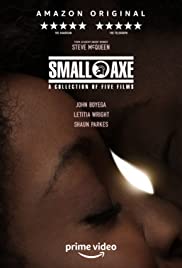
SMALL AXE: LOVERS ROCK
UK, 2020, 70 minutes, Colour.
Amarah Jae St Aubyn, Micheal Ward.
Directed by Steve McQueen.
This is the second in a series of short television films, this Small Acts, cowritten and directed by Steve Mc Queen (13 Years a Slave, Hunger).
The series focuses on the life of West Indian migrants to the United Kingdom and the next generations, focusing on stories of the 1980s, the communities in London, experiences of racism.
The short story takes place over one evening, introducing a range of young West Indian Londoners, especially to young women who enjoy singing together in their work at home, Martha (Amaro Jae St Aubyn) and her friend to go off to a party at a suburban home. The film also focuses on some men, an outsider who gatecrashes the party and disturbs it, but also Franklin and his friend who get close to Martha and her friend, the friends not succeeding in a relationship or is Martha enjoys dancing with Franklin (Micheal Ward), going out with him, a lift home, his being interrupted at his work by his white co-worker, the promised to see each other again.
The important thing about the film is the music. There is singing, there is dancing, there is exuberance, West Indian rhythms. They continue throughout the film and are a reminder of the popularity of the music and its influence on young people at the time, at a time when there were still somewhat segregated, enjoying life together, not yet able to mix with the white population.
Those who identify with the characters and the music have found this quite an exhilarating short story. Others, feeling themselves observers, have watched and listened with some detachment.
Immortale, L'/ The Immortal
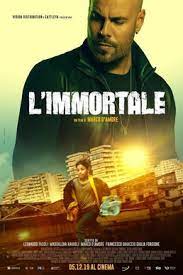
L’IMMORTALE/ THE IMMORTAL
Italy, 2019, 116 minutes, Colour.
Marco D' Amore, Giuseppe Aiello, Salvatore D'Onofrio, Martina Attanasio, Gennaro Di Colandrea.
Directed by Marco D’ Amore.
The Immortal is a movie spin-off from a very successful television series, Gomorrah, which the star, Marco D’ Amorer starred in and directed. He has directed this film, and created an enigmatic character for himself.
The initial setting is Naples, the waterfront, the gangs of past decades, frauds and knockoffs. The film offers a portrait of the young boy, Ciru, orphan, bonding with other boys, but finding a father-figure in Bruno, one of the leaders in the Neapolitan neighbourhood. The boy is also devoted to a young woman, Bruno’s girlfriend, a singer in clubs. However, there are betrayals and the death of the singer.
The film opens enigmatically with a long staring shot of two brothers, Ciru then finding himself drowning in the water, a woman and son in a building which collapses, the baby surviving. The adult Ciru survives, is given a commission in Latvia to look after cocaine imports and distribution, linked with the Russian drug dealers in the aftermath of the Soviet Union, but challenged by local drug dealers who resent the Russian dominance. Ciru plays one-off against the other.
Bruno, 30 years later, is now his loyal subordinate, urging the local Italians who produce knockoffs to become involved in cocaine dealing. However, Bruno is jealous of Ciru after all the decades, betraying him, leading to a shootout.
The film was well received by Italians who also admired the television series.
- Tradition of Italian gangster films? Neapolitan settings? And television miniseries? This film is a spin-off form the television series, Gomorrah?
- The Italian settings, homes, waterfront, smuggling and fraud? The Latvian settings, the Italian community, the local drug dealers, the Russian dealers, conflicts? Importing drugs, dividing, selling on? The waterfront sequences? The musical score?
- In the initial focus on Chiru and his brother, the stair, Chiru in the water, his memories, his story? His history of survival? His nickname of The Immortal?
- Chiru, the Don, survival, being sent to Latvia, in charge of operations, the contact with Bruno, Bruno and his loyalty, the other members of the crew, Virgilio and his wife, their work in fabricating knockoffs? The invitation to participate in drug deals? The money? Decisions?
- Chiru, in Latvia, his luggage and furniture, the extra drugs? The meeting with the Russians? His being taken by the Latvian dealers, the confrontation? His opting for the Russians, the double deal, the meetings and the massacre? The Russian chief and his support? The passing of time, Chiru and his life, loner, Virgilio’s wife and her interest, initial suspicions? Chiru and his devotion to his work? Betrayals, setting up the Latvians, the shootings? Final confrontations? And the finale with his brother?
- Bruno, mentor to Chiru the past, their work together, reliance, stories, Chiru the orphan, finding a father-figure, Stella and her singing at the club, his devotion to her? Betrayals, her being shot?
- Bruno older, 30 years in Latvia, loyalty to Chiru, the work, the team, the decision about the drugs? His betrayal? His jealousy of Chiru? The final confrontation? The Russians, the shooting of Virgilio?
- The success of the film as a gangster story, dealers, Italians, European story? Portrait of a loner gangster? Complications of loyalty and betrayal?
Martin Eden
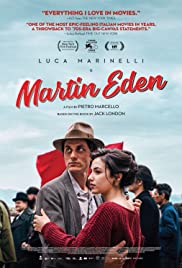
MARTIN EDEN
Italy, 2020, 129 minutes, Colour.
Luca Marinelli, Jessica Cressey, Denise Sardisco, Aurelia Ranieri, Elisabetta Valgo, Carlo Cecchi.
Directed by Pietro Marcello.
Novelist, Jack London, is best known for his stories, Call of the Wild and White Fang. He wrote a number of short stories about the Klondike and the gold rush where he spent a great deal of time as well as stories of the Pacific. He was also concerned about social and socialist issues and individualism. This is reflected in his novel, Martin Eden, which has some autobiographical links. The original novel was set in Oakland in the early 20th century.
This version is an Italian interpretation, keeping close to many aspects of the original novel. It is now set in Naples and retains the names of several of the characters, Martin Eden himself and his eccentric friend and sometimes-mentor, Russ Brissenden. However, the names of the women and families have been changed.
On the one hand, the scenario plays as if it was a realistic dramatising of Martin Eden’s life and career. On the other hand, there are continued suggestions, evocations, that while this is a 20th-century story, it is a 20th-century somewhat parallel to the reality. Throughout, there are implications of different decades, mixed together, costumes and decor, cars and transport, technology from recorders to typewriters. Which means then that, while we are watching an Italian unfolding, the story is universal and transcends the decades.
This is reinforced by the inclusion of a great deal of film footage from the past, again illustrating different decades, ships and seafaring, crowd sequences and political movements…
Luca Marinelli won the Best Acting award in Venice, 2020, for his portrayal of Martin Eden. Eden is not a particularly sympathetic character, which means that the audience is observing him, often judging him, rather than empathising with him and his struggles. We see his poor background, his devotion to his mother, his relationship with his sister and her husband whom he dislikes but who challenges him to work. He is a sailor, harsh experiences at sea.
The film dramatises a turning point in his life when, after visiting a bar, he helps the wealthy young man who is set upon by thugs – and the young man gratefully introduces him to his family, the Orsinis, upper-middle-class, conservative, initially welcoming him, and his being smitten by the daughter of the family, Elena (Jessica Cressey). She challenges him, especially concerning his education and he begins a two-year course, going to exams and failing, learning to read, learning to speak grammatically, buying a typewriter, beginning to write stories, sending them off and being rejected.
However, his education and continued reading means that he gives a great deal of thought to social conditions, going to meetings, encouraged by the eccentric Russ Brissenden, making speeches about the importance of the individual, a critique of socialism (all really being enslaved by the socialist bosses), heckled and rejected. And, rejected by Elena and her family who disagree him.
But, he succeeds with his reputation, is preparing for a lecturing tour of the United States. He is disturbed by Russ Brissenden’s death, is in a relationship with the young woman, Margharita, whom had first met years earlier at the bar.
The climax of the novel is Martin Eden confronting himself, what he has made of himself, what his success has made of him – something of the confrontation that Jack London himself felt, dying at the age of 40, suggestions of suicide.
This is something of an esoteric interpretation of London’s novel.
- The Jack London novel? His career, sailor and work? Writing? Political and social views? The relationship of the novel to his own life and attitudes?
- An Italian film, a free interpretation, the transition to the Italian settings, Naples and general? Transferring the characters, situations, political discussion?
- The stylised nature of the film, ranging through the particular decades of the 20th century, the range of eras in their look? An alternate 20th century world? The references to the particular decades, implements, costumes, décor, the range of technology?
- The stylised nature of the film with its incorporation of old film footage, representing the past, shortcuts for information, delineation of character, Martin Eden at sea, in the ports, his work, the ships, the ship sinking…? The musical score? Classics?
- 21st-century perspective on Jack London, socialism, individualism, the perspective of the filmmakers? Martin and his individualistic perspective?
- Martin, his background, poor, upbringing, family? Lack of education? Going to see, his work on the boats?
- His sister, her husband, boarding, disagreeable, being offered a job, his refusal?
- His life, prospects, the taverns, the encounter with Arturo, saving him? The introduction to the Orsini family, their wealthy way of life, society? The meals, his visits, close on what to wear, his manner? His opinions? The reaction of the parents? The attraction by Elena?
- Martin, his decision, to study, his being urged to read? His vocabulary? Eleanor and her help and encouragement? The exam on Roman studies, his failing? The continuing over two years? His skills, writing, the stories, sending them to publishers, their being returned? With his mother, her support? Family memories?
- Buying the typewriter, the books, the libraries? His writing, the transition?
- The change in Martin, the acceptance of the manuscript, his exhilaration, his mother? Eleanor, her love? The visits? But his frank talking, the judge present, expounding his ideas, Eleanor and her reaction, her mother’s reaction? His becoming persona non grata?
- The past, his encounter with Margharita in the bar? Her working as a waitress, the encounter with Eleanor and his derogatory remarks? His going back to her, and support? The tensions in the relationship?
- Eleanor, disdaining Martin, his success, change, his visit to her, his rejection?
- Martin and his friendship with Russ Brissenden, the eccentric, at the Orsinis, the discussions, his health, his writing, giving it to Martin? His suicide?
- Martin, his independence, success, being invited to give speeches, the impassioned speeches, the objections from the audience? The socialism context? Yet his focus on individualism? And his own person individualistic attitudes?
- The plans for the United States, Margharita, his health? The effect of his notoriety?
- The image of the ship sinking? Martin and his walking into the sea?
Eternals
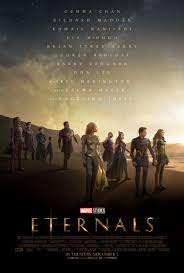
ETERNALS
US, 2021, 157 minutes, Colour.
Gemma Chen, Richard Madden, Angelina Jolie, Salma Hayak, Don Lee, Kumail Nanjiani, Harish Patel, Lia McHugh, Barry Keoghan, Lauren Radloff, Kit Harrington. Voices of Bill Skarsgaard, Harry Styles, Patton Oswalt, Mahershala Ali.
Directed by Chloe Zhao.
Once upon a time or, once upon an eternity, Celestials created our universe (with acknowledgement to Greek mythology). They also created a special group, Eternals, who could be sent to different planets to safeguard the populations there, eventually coming to earth 5000 BC, seen helping in Mesopotamia, in Babylon, defending the humans from gigantic complex monsters, the Deviants. This all comes from the imagination of Jack Kirby and his Marvel Comics, brought to the screen, with a budget of $200 million by Chloe Zhao (not at all like her Oscar-winning Nomadland).
For those who are intrigued by these premises and the delving back into mythologies, the advice would be: go for it. For those less intrigued, it might take some time to warm up, or, for some, the whole proceedings might seem a bit too silly. And the running time is over 2 ½ hours with some hostiles obviously enjoying remarking that the running time seems eternal! (At times, it does, and at one stage a character says we need some action scenes – but, while there are many conversations and analysing the situations, the many action scenes sometimes need a breather.)
And, then, we are in present-day London, sharing the experiences of Gemma Chan’s Sersi, her boyfriend, Dane (Kit Harrington) and the sudden appearance of the dashing hero, Ikaris (Richard Madden keeping his Scots accent). There is an earthquake in London, reverberating around the world – and after centuries of absence, The Deviants are back.
So, Sersi and Ikaris are Eternals, illuminations frequently appearing on their hands, in their faces, over their bodies, superhuman powers – seen, often, in deadly combat and high special effects with The Deviants.
It seems time for the Eternals to reunite for their Celestial mission – although, they, and we, discover that all is not clear, Celestial ambiguities, betrayals, and the announcement of the Emergence, which means the destruction of the human race to make way for a bigger and better world population. Which of the Eternals is for this, who is against?
Much of the central running time of the film shows Sersi and Ikaris Travis in the world to find where the other Eternals have been living all these centuries. Some of the Eternals are quite engaging and likeable, others not so much. This reviewer liked Gilgamesh (Don Lee/ Ma Dong-seok) making big pies in outback Australia and guarding the catatonic Eternal, Thena (a blonde Angelina Jolie). Interesting and engaging is Kingjo (Kumail Nanjiani) who has become a Bollywood star and director, seen in a dance routine, and always accompanied by his valet, the rather roly-poly Karun (Harish Patel) making a documentary with his camera at the ever ready, no matter how drastic the situations! And, after a flashback to Hiroshima, we are introduced to Patosh Brian Tyree Henry) wracked with some guilt because of his contribution to the Trinity project. (And some curiosity with him because he is a gay character leading to the banning of this film in China.) The leader is Ajack (Salma Hayek).
Not so keen on Sprite (Leah McHugh) who never grows up and is often very petty. Nor keen on Druig (Barry Keoghan) who has been working is on forests. Later, the mute Makkari (Lauren Gridlock), genial, who can travel at light speed around the world.
Quite a range of women and men, and quite multi-ethnic.
Which means then that the latter part of the film consists of the battles, special effects, Deviants, betrayals and choices, discussions about the human race and whether it is worth saving, condemnations of its faults and follies, but acknowledgement that humans have love and warmth and potential.
But, of course, this is the first film and it is promised that the Eternals will return. (And, yes, good things come for those who wait, especially those who wait during the very long and detailed credits, for the post-credits tantaliser, this time with Kit Harrington opening a chest daring himself to take out the sword of Blade…).
- A very different part of the Marvel Universe? Going back into Greek mythology?
- The variety of time eras: pre-Earth history, the galaxies, the Celestials in the celestial world, the creation of the Eternals, coming to earth, the earth historical episodes, the continued threat of the Deviants? The 21st-century, London, Australian desert, the Amazonian jungle, the US Middle West, Asia, Indian Ocean islands? The musical score?
- Audience engagement with the Eternals, the characters and personalities, their powers, action, banding together, betrayals, affection towards the human race, not?
- Audience involvement with the Eternals, their creation, the Celestials, the main Celestial, ambitions for Eternals, to spread throughout the galaxies, helping populations on planets, for earth, to save the humans, to combat the Deviants, and the discovery of the plan for the Emerging, destroying the humans, repopulation?
- The activities of the Eternals, in Mesopotamia, in Babylon, the humans, their lifestyle, the attack by the Deviants, the Eternals as warriors, the battles?
- The transition to London, the information of the separation of the Eternals, for many centuries, living their lives, within the human condition?
- The introduction to Sersi, lecturing, the museum, the earthquake? Her relationship with Dane? Memories of Ikaris? Sprite, friendship, always youthful? The arrival of Ikaris, the new situation, her leadership? The decision to re-group the Eternals?
- The journey to find the Eternals? The visit to the Australian desert, Gilgamesh and his cooking, his ethnicity, Thena and her presence in the desert, Gilgamesh protecting her?
- Kingo, the touch of comedy, Bollywood films, the dancing routine, filming, his work as actor and director, the arrival of the Eternals? Karun as his valet, and forever filming? His jovial personality? Reluctance to go?
- The visit to the Amazon, Druig, useful, working with the locals, his powers, suspicious? Persuaded?
- Phastos, the flashbacks to Hiroshima, his contribution to Trinity, his regrets, his partner, their son, secluded life?
- Eventually meeting Makkari, in the ship, the power of moving so rapidly? Sympathetic?
- Ajak as leader, the news of her death, Sersi as her appointed successor? The flashbacks to Ajak and her leadership? Retirement, the desert? The presence of Ikaris? The complications about the wishes of the Celestial leader, the Emerging, Ajak and her attitude, Ikaris and his attitude, believing in it? His killing Ajak?
- Ikaris, personality, his deceptions, his love for Sersi, but leading her on? The battles, ultimate decisions, Sprite and her betrayal, opting to go with Ikaris? His being exiled?
- The visual effects for the range of battles with the Deviants? Gilgamesh and his offer to say the others, his death? Thena and her Amazon-like warrior activities? The visualising of the monsters, their voices, touches of personality? The range of battles, in the Amazon, in central Australia, the buildup to the confrontation on the island, the volcano?
- The aftermath of the battles, the Eternals and their opting in sympathy for the human race despite all failings? Ikaris and banishment? Sprite and forgiveness? Phastos returning to his family? Kingo and his upsetting himself from the main battle, the return, and Karun and his camera?
- This Mission accomplished – but post-credits sequences, the connection with other Marvel superheroes, the Eternals returning?
XY Chelsea Manning
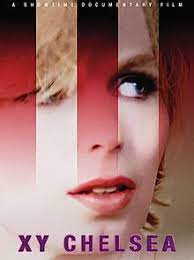
XY CHELSEA MANNING
US, 2019, 92 minutes, Colour.
Directed by Tim Travers Hawkins.
Chelsea Manning has become a significant figure in 21st-century American history and culture.
Formerly, Bradley Manning served in the US Army, in military intelligence, serving in Iraq. Manning then downloaded thousands of military documents, sent them to Julian Assange and WikiLeaks, the main available site for exposing military violence. WikiLeaks published more details and names than Manning intended.
Manning was arrested, tried, sentenced to 35 years in military prison, served time in solitary confinement, was transferred to Fort Leavenworth. At the end of his presidency, Barack Obama commuted Manning’s sentence and in 2017 Manning was released from prison. Manning had pleaded guilty.
The other significant element in Manning’s life was his sexual orientation and his move to transgender. Bradley Manning became Chelsea Manning.
This documentary focuses on these elements in Manning’s life but takes the line of the personal approach, a great deal of footage of Manning at the time of trial, glimpses of prison, and a focus on Chelsea Manning’s activity after release from prison, forthright, speaking publicly, even and attempt at standing for the Senate in 2018. But, it is emphasised, that the authorities were still in pursuit of Manning, pursuing some arrests and internment.
Some reviewers have expressed disappointment with this film – hoping for a very objective look at Bradley Manning’s activities, the information that was given to WikiLeaks, the consequences.
Which means then that audiences of this film are invited to meet and understand Manning, details of childhood, photos of childhood, distant relationship with father, distant relationship with mother who then suffered a stroke and is seen talking about her child. There are sequences to explain the military background, experience of warfare, the discovery of the information about American military violence, the urgency Manning felt in downloading it and communicating it. (And there are various scenes with Julian Assange, especially after his arrest in the UK from the Ecuadorian embassy.)
Manning is frank about his/her gender journey and adjusting to being female. Manning is also frank in public speaking and interviews (although sometimes hesitant) about the career, the risks, continued campaigns about the military and violence.
Since Chelsea Manning was comparatively young when sent to prison and when released, this film would be only an initial film in her life and career.
The subsequent film by director, Tim Travers Hawkins was on Personality, the use of psychological methods to assess personality (some condemnatory, including some mixed messages on the Myers Briggs Type Indicator).
Blue Bayou
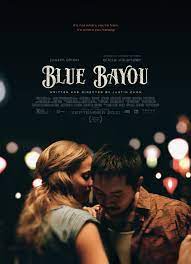
BLUE BAYOU
US, 2021, 117 minutes, Colour.
Justin Chon, Alicia Vikander, Mark O'Brien, Linh Dan Pham, Sydney Kowlaske, Vondie Curtis-Hall, Emory Cohen, Susan McPhail.
Directed by Justin Chon.
This is strong drama, very strong and powerful – and recommended for audiences who appreciate the dramatic raising of social issues. Some people have said that the film pulled no punches. Rather, for this reviewer, it was rather like being put through the wringer. And, during the final credits, we are still being squeezed in the wringer.
Even as we watch, we are hoping that everything would be resolved, for a happy ending, after all, is this is an American film and that’s what we might expect. But, no, with the final image and all through the credits, there is no let up, no simplistic solutions.
And why are we so involved. The central character, Antonio LeBlanc, is a Korean orphan, migrating to the US at the age of three in the 1980s, adopted, abused, discarded, stealing felonies. But, nevertheless he is a most engaging character, a credit to Justin Chon (who has written the screenplay, directs and acts), American born but with his own Korean heritage. He creates such a likeable man, joyful father delightfully playing with his stepdaughter, a caring husband to his pregnant American wife, eliciting sympathy despite his limitations. Of course, it is the migrant issues, especially the dramatic highlighting of deportations that gripped us.
This means that we watch with Australian eyes, memories of the post-World War II migrations, acceptance of the British, the Poms, but wariness of the Italians and Greeks, dagos, Poles and migrants from other countries of Europe. It means memories of the experience of the acceptance of refugees from Vietnam in the 1970s and 1980s, much more acceptance here. And, then, 20 years of boat people, of turn backs, of engagement against people smugglers, harsher and harsher legislation, refusal of entry to boat people, calling them illegal even though they had rights to refugee status, Muslims, Middle East, isolation on Nauru, on PNG’s Manus Island, years and years of harshness, stagnation, futures denied.
And, more to the point, the years of the experience of the Sri Lankan family in Queensland’s Biloela, accepted by the community and welcomed, yet their being taken, isolated on Christmas Island, kept in custody, years and years of legal wrangles about the refugee status, imminent threats of deportation, but the issues of the nationality of their children, the possibilities for compassionate intervention by politicians – but none forthcoming.
Perhaps we were ready to be put through the wringer even before we go into the cinema.
It is a surprise to discover the number of Korean and Asian children, apart from the Vietnamese, who had been adopted in the US. It is difficult to follow all the details of legislation about adoptions, rights, citizenship, times and dates on which residency and deportation depended. All very complicated, bureaucratic.
But, here is the story of Antonio, sympathetic, supported by his pregnant wife and loved by her little daughter. But, prejudice and racism forever hovering. His mother-in-law unwilling to speak to him, ready to snatch her granddaughter away from him. His wife’s former husband, police and angry, and the aggressive hostility, of his partner, even to getting his buddies to bash Antonio, preventing him from getting to the court in time for his hearing. And there is the back story of his adopting parents, his unwillingness to make contact with his mother, eventually going to see her, his and our being puzzled at her behaviour towards him during his pleading visit.
The screenplay does not make Antonio out to be a saint. Not only has he stolen in the past, his felonies and race preventing him in the opening interview from being given a job as a mechanic, but to get the money for the lawyer for his case, he and his friends steal more motorbikes. We realise that according to the letter of the law, authorities will not easily grant him citizenship.
And, then there is Antonio’s encounter with the Vietnamese refugee, Parker, her kindness at the hospital, meeting him in the street when advertising his tattoo studio, desperately in need of funds to pay for a lawyer to fight his deportation case, inviting him to her home for a Vietnamese gathering meal, her genial father, Antonio asking whether he regretted dividing his family on the boats escaping Vietnam and his replying “never”, Parker’s visit again for another tattoo and Antonio’s harsh dismissal, her terminal cancer, their talking, the sadness of her death.
If only those against migration or those who say they are for migration but are rigid in their interpretation of laws, rules and regulations, could sit down quietly and watch this story, get to know the characters from the inside, and be moved.
- The impact? Strong? For an American audience? Asian Americans? International audiences?
- Social concern and issues, migration, adoption, refugees, citizenship, changing legislation and requirements, possibilities for deportation?
- The title, a Louisiana story, Roy Orbison song, sung by Alysia Vick and – and the significance of the lyrics, and singing it at a Vietnamese gathering?
- The work of the director, writing the screenplay, his research on cases of deportation, the final credits and the pictures and information? His performance as Antonio?
- Antonio’s story, Corian, his mother not wanting him, the growing flashbacks and the story, the revelation of his mother trying to drown him, her sending the letter, his adoptive father throwing it away, Antonio finding it? The flashback visuals of the attempted drowning? Brought to the US, aged three? The adoptive parents, harsh treatment, foster homes? Stealing motorbikes? Felony charges?
- Antonio introduced, married to Kathy, stepfather to Jesse, the warmth of the domestic sequences, Jesse and her fondness for Antonio? Kathy, separated from Ace, his walking out? Jesse alienated from him? The domestic sequences, love for each other?
- Antonio, his work with tattooed is, seeing him at work, other workers, conversation? The boss, Antonio needing to pay? His later going out onto the street, advertising, the encounters with Parker, the fleur-de-lis stat to, her coming again for another tattoo? His skill as a mechanic, the opening interview, interviewer offscreen, racial prejudice, his past felonies? His friends, the talents with the bikes, the rides, eventually teaming up, the need for money for the lawyer, the robbery? Ace knowing the truth? His deceiving Kathy?
- His mother-in-law, her hostility, not talking to him, always ready to take Jesse away?
- Kathy, pregnant, the ultrasound, in hospital? Antonio and his encounter with Parker, measured in the street, the town to, the invitation to the gathering, the family going, enjoying it, Kathy singing, the food and preparation, Jesse and her curiosity? Antonio asking Parker to ask her father about the fleeing from Vietnam, separating the family, his standing by his decision? Parker, her cancer, her week, coming again to the parlour, Antonio rejecting her request, the conversations, recounting his memories, her death, the funeral?
- The police hostility to Antonio, Ace, his partner, verbal abuse, later his friends bashing Antonio, preventing him to get to the court, Ace hostile, bringing Kathy, her punching the partner? Ace threatening jail?
- The hostility, raising doubts about Antonio’s rights, legislation, dates and complexities, his citizenship, after 30 years in the US, the threat of deportation?
- The visit to the lawyer, his sympathetic listening, his work, the fee? The consequences and Antonio and stealing the bikes?
- Witnesses, Antonio refusing to visit his adoptive mother, Kathy mystified, his finally relenting, the visit, the impassive older woman, not responding to his pleading? Yet her turning up to the court?
- Antonio, the bashing, absent from the court, the order for his deportation?
- The dilemma for Kathy, to take Jesse and go with him or not? Her mother’s interventions?
- Antonio, giving himself in, the travel to the airport, his leaving, Kathy and Jesse arriving, Ace arriving, the dilemma, his urging Kathy and Jessie to stay? The final close-up of Antonio?
- Issues of migrants, refugees, citizenship, legislation, strict interpretations, lack of humane interventions, deportations?
Last Champion, The
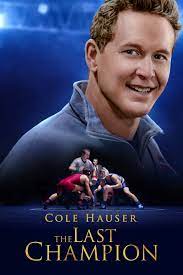
|
THE LAST CHAMPION US, 2020, 122 minutes, Colour. Cole Hauser, Sean H.Scully, Annika Marks, Randall Battinkoff, Halle Todd, Peter Onorato, Bob McCracken, Casey Moss, Michael John Madden. Directed by Glenn Withrow. |
Some responses to The Last Champion have taken the either/or approach. It has depended on interests and background. One response has been to the film as a sports film, high school students and their coach. The other response has been to the personal journey of the coach, failure, regrets, possibilities for redemption. The best response, of course, is a both/and, a personal redemption story through sports and coaching.
Wrestling fans of the past may be familiar with the winner of wrestling gold in the Olympic Games at Atlanta, 1996. His name was John Wright. He was a high school champion, highly awarded. After winning the gold medal, it was revealed that he had taken drugs and he was stripped of his metal. This information is quickly given in the opening minutes of the film, photos, newspaper headings, highlights.
However, the action of the film takes place 20 years later, John Wright returning to his home town, Garfield, Washington State, his mother having died and his need to organise the stale of his family home. He had been working on a ranch with cattle.
John Wright is played by Cole Hauser, perhaps better known for thrillers and action films. He is especially convincing in the early sequences, shunned by some of the townspeople because of his drug scandal, welcomed by others, especially his coach at high school who invites him to a meal, gets him some work at the local fire station. In the meantime, we are shown a high school student, Michael Miller (Sean H.Scully), shoplifting, helped by the coach, glimpses of his dysfunctional and sad mother (Hallie Todd, who co-wrote the screenplay with her husband, the director, Glenn Withrow, and their daughter Ivy, a family enterprise).
It is not difficult to see where the film is going – after all, it is based on an actual story. Which means that it may not appeal to an audience which is looking for more sophisticated twists. Rather, this is a story that all audiences can watch, identify with worry about, hope.
When the coach collapses and dies, it is obvious that John Wright will be approached to work with the high school team. There is some complication because Wright is in financial need and he approaches a banker, friend from the past, who does a deal with Wright to help him financially and that he coach his son to be the state champion. There is a brutal scene, which Wright observes but does not intervene in, where Michael is bashed by three of the wrestling team. And this will weigh on Wright’s conscience.
This a small town America, quite folksy in many ways, would have been called homespun in earlier decades. People still go to church. They do line-dancing. The large choir sings Christmas carols. The pastor (dressed in everyday clothes rather than formal) is genial, helps with people’s lives, his daughter Elizabeth (the obvious romantic interest) works in the surgery. And, people are kind and generous for the most part.
There is a church sequence, John Wright trying to come to terms with his past and his present, actually confessing to the pastor and experiencing forgiveness. And his work, thorough and professional with the boys, is part of his atonement.
On the sports level, lots of wrestling sequences, training, matches, the state competition, the buildup to the final bout between Michael and the son of the banker…
This film has been welcomed by many audiences who want good stories, stories about goodness which do not over looking failings, a film which is edifying and inspiring.
- The title? John Wright as a champion? In the Olympics? His disgrace? His redemption and atonement?
- Washington State, the town, the large home on the edge of town, the school, sports hall, diners, the atmosphere of the American small town? The musical score?
- The opening credits, the immediate information about John Wright, his talent at school, all-American, wrestling competitions, winning, going to the Olympics, his victory? The drugs? Losing his medal? Disgrace?
- 20 years passing, his working with the cattle, the scenes on the range?
- John Wright and his return home, his mother’s house, the lavish interiors and possessions, her death, his plans to sell the house? His visit to Bob, relationship in the past, John and his financial difficulties, Bob and the refusal of the loan? The later meeting, Bob and his proposal about a loan, and John coaching his son to become state wrestling champion? The agreement?
- John, the diner, people walking out? Other people welcoming him home? The importance of the friendship of Frank, his role as a coach, work in the fire department, offering John work?
- Frank, Michael and the shoplifting episode, the anger of the proprietor, Frank and his going as guarantee, training Michael in wrestling? The scenes of Michael’s home, the absent father, his mother and her drinking, slatternly life, his sister and her talents, loss of opportunities, having to look after the little sister? The little girl, her devotion to her mother? The domestic scenes?
- Frank, admired in the town, his collapse in the street, his death, the wake?
- John, his age, the experiences, his attitude towards life, acknowledging his mistakes, regrets? The encounter with Elizabeth, with her father? Past attachments? Elizabeth, work in the school, medical? Her father, the pastor, ordinary clothes, welcoming people to the church?
- John, the offer of coaching the wrestling? His acceptance? With the young men? The training, his past experience, tough demands? Michael’s presence?
- The other boys, their angers, the bashing of Michael? John watching, not intervening? His guilt? In the church, the confession to the pastor and the repercussions? His acknowledging the truth? His support of Michael? His condemnation of the boys – and the boy in the diner, admitting the truth, opening up to John? The other boy? Scott, support of his father, being transferred to a rival school?
- John, moods, taciturn, Elizabeth and her attempts to draw him out, the meal together, his being quiet? Helping with the packing?
- Michael’s family, his mother being present at functions, but deciding to leave, abandoning the family? Michael having to go to work? The meeting in the church, the pastor presiding, the appeal, the various responses, Frank’s widow and her offered to support the family? (The atmosphere of the townspeople, together, the dances, the Christmas carols…?)
- The training, the competitions, the collage of the various bouts? Michael and his emerging as a champion?
- Audience response to wrestling, understanding the techniques, the points and scoring?
- The buildup to the final? The people in the town being present and supportive?
- The atmosphere of a sports film, coach and students’ film, the details of the final competitiveness, Bob and his intervention and having to be set down, the tension for the audience, Michael ultimately winning?
- A true story, Olympic victories, disgrace, the consequences, the possibilities for redemption, and action in atonement?
Last Night in Soho
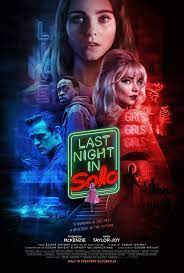
LAST NIGHT IN SOHO
UK, 2021, 116 minutes, Colour.
Thomasin McKenzie, Anya Taylor Joy, Diana Rigg, Matt Smith, Terence Stamp, Rita Tushingham, Michael Ajao.
Directed by Edgar Wright.
Welcome to the imagination of Edgar Wright: for those who have been there before, Shaun of the Dead, Hot Fuzz, And of the World, Scott Pilgrim, Baby Driver, they will be eager to return. For those not familiar with Edgar Wright, they might well be puzzled – and intrigued.
Wright has co-written and directed this film but has also selected at Playlist with many of the popular songs of the mid-1960s. Those with the accessible songs from artists like Cilla Black, Petula Clark, Sandy Shaw and, of course, the Beatles. They play throughout the film, providing mood and background to the characters and the situations.
And this is important. While the main action takes place in the present, the film returns time and time again to London in the emerging swinging 60s, the streets and lights of Soho, the clubs (many euphemistically called Gentlemen’s Clubs), and a huge cinema hoarding advertising Sean Connery as James Bond in Thunderball.
In the present, we are introduced to a young woman, finishing high school, going to London to become a fashion designer. She lives in Cornwall, somewhat sure of herself there, but immediately finding herself out of her depth in London, mocked for her provincial accent and dress, the Mean Girls at her accommodation and the school. She is Eloise Turner, Ellie, with a complex performance by New Zealander, Thomasin McKenzie. She does well in class. But she wants to get away from the students, answers an advertisement for a bed sitting room, encountering Miss Collins, an elderly veteran of Soho, who welcomes Ellie. Miss Collins is played by Diana Rigg in her final role, initially seeming a comparatively subordinate character but becoming key by the end. It was Diana Rigg’s last film and this film is dedicated To Diana.
Diana Rigg was flourishing in the mid-1960s on stage and television screen, The Avengers. But it was also the period of stardom for Rita Tushingham (including Dr Zhivago) and Terence Stamp. Rita Tushingham plays Ellie’s solicitous grandmother. Terence Stamp plays a mysterious ageing character who frequents a Soho diner.
That establishes the basis for the drama – but, Ellie’s mother was psychic and so is Ellie, never so much as in her most elaborate dreams, back to the 60s, encountering a would-be singer and dancer, Sandy, another strong performance by Anya Taylor Joy. Wright uses the device of mirrors, Ellie looking into the mirror and seeing Sandy, and many variations on this alter ego experience, Ellie becoming Sandy at times. Sandy is ambitious, auditions, song and dance, under the tutelage of Jack, Matt Smith, a manager who ultimately exploits her with the so-called gentlemen at the clubs. This builds up to conflict and confrontation.
And, in fact, Wright goes back to his horror background and the zombie-like creatures from Shaun of the dead, changing the tone of Ellie’s nightmares, the identification with Sandy, apprehensive about Jack murdering Sandy, and Ellie going to the police, going to libraries to research the newspapers of the period to discover what had happened… She is helped by a sympathetic fellow student in design, John, Michael Ajao, who falls foul of Miss Collins.
And with this kind of imagination, the end has to be seen to be believed, twists, horror, even conflagration. And, if this review arouses curiosity, then it is probably best to go to see Last Night in Soho.
- The blend of ordinary story, psychic episodes, nightmares, horror? The imagination of the director?
- UK in the 21st-century, home in Cornwall, life in Cornwall, the contrast with London, fashion design school, accommodation, bedsit, library research, police precincts? The contrast with swinging 60s London, the Thunderball hoarding, the clubs, the lights, Soho, clubs and interiors, atmosphere?
- The musical score, the songs of the 60s throughout the film, mood, accompanying characters, situations, the relevance of the lyrics? Creating the atmosphere of the time?
- Ellie’s story, her mother’s death, psychic powers? Her grandmother and her support? Ambitions for dress design, arriving in London, seen as quaint with her accent, her own clothes? The Mean Girls attitude of her fellow students, sharing the room, outings, scoffing at her? The encounters with the male students? Her reaction, at classes, successful? Wanting to move, the advertisement, replying to Miss Collins, the interview, moving in?
- The introduction to Miss Collins, her age, her bedsit, in Soho for decades, welcoming Ellie, the strict conditions? Supportive? Her later reaction to Ellie’s behaviour, with John visiting, ousting him? Her criticisms of Ellie, yet relenting? The background for the final revelation?
- Ellie, going to sleep, the dreams, the beginnings of the nightmares? Going back to Soho in the 60s, the interest, delight, the dress fashions of the time? Going to the club, the use of mirrors with the reflection of Sandy in one, Ellie in the other? The effectiveness of this device? Alter ego? Their interchanging actions, especially the dancing? Ellie identifying with Sandy, her ambitions?
- The character of Sandy, self-confident, from the swinging 60s, her clothes, going to the club, ambitions, to sing and dance, recommended to talk with Jack, his role as manager, her audition, her success, at the clubs, Jack and his manipulation of her, becoming a pimp, her experience with the “gentleman”? Her reacting against this, defiance of Jack? Ellie and her visions, assuming that Jack had murdered Sandy?
- Ellie going to the police, the explanations of her visions, going to the libraries, searching for information about missing Persons?
- Ellie and her going to the clubs, the encounter with the mysterious elderly gentleman, his presence? Ellie, her working the diner, with customers, erratic hours? The discussions with the gentleman, Ellie suspicious that he was Jack, his going into the road, hit by the car? The explanation that he is the policeman, and Ellie remembering him in her dreams?
- Ellie, with Jack, fellow student, his friendship, support, the search for the missing persons? The return to the bedsit, being ousted?
- The effect on Ellie, her own work, the dress designs, the encouragement of the tutor? The reaction of the other students?
- The dreams becoming intense, the horror tropes, the men, haunting Sandy, like ghosts, the zombies touch? The intensity and the effect on Ellie?
- The buildup to the climax, Miss Collins, the confrontation with Ellie, the realisation that she was Sandy, that she had murdered Jack, mayhem with the “gentleman”?
- The touch of the apocalyptic, the fire, Ellie’s escape, Jack and his escape, his help, Sandy destroyed?
- The aftermath, Ellie success, her show, the models and the catwalk, Jack and her grandmother present? Success?
- How effective a 21st-century story, a 60 story, the blend, and the touches of horror?